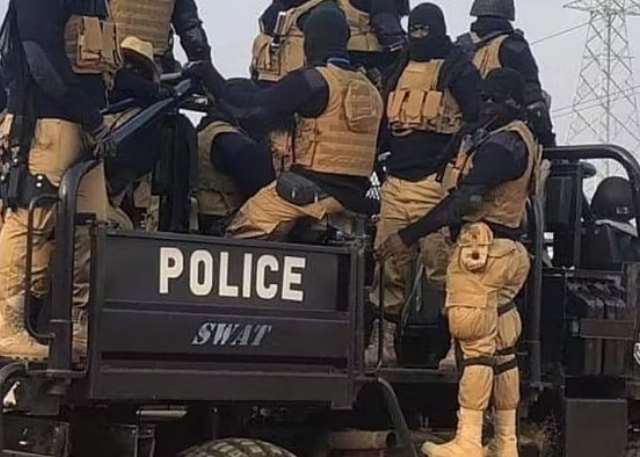adverts
Ghana’s national security apparatus plays a critical role in protecting the country’s leadership, sensitive government installations, and national stability.
However, concerns have emerged over the temporary nature of employment for security operatives, raising potential security risks for the nation.
Assistant Superintendent of Police and counterterrorism expert Mohammed Abdul Hanan EL-Saeed has highlighted the urgent need for a sustainable approach to managing Ghana’s national security personnel.
adverts
According to him, the current practice of recruiting and disbanding highly trained operatives with each political administration presents a significant national security threat.
Ghana’s national security structure is composed of highly trained personnel, including military and police attachés, who work closely to maintain law and order and ensure the security of key government figures.
These operatives undergo rigorous training in various advanced military and intelligence techniques, such as:
- VIP protection and personal security tactics
- Counterterrorism operations and surveillance
- Use of military-grade weapons and unarmed combat
- Convoy escort and anti-hijacking measures
- Rappelling, navigation, and patrol operations
- Intelligence-led security operations
Their training, which often takes place in top-tier military institutions, equips them with advanced tactical and combat skills, making them an essential part of the country’s defence and security architecture.
Despite their expertise, national security operatives in Ghana do not have permanent employment status. Their tenure is often tied to the political administration that enlists them, meaning that they typically serve for a maximum of four to eight years before being dismissed when a new government assumes power.
This cycle of recruitment and dismissal raises concerns about the long-term stability and professionalism of the national security system. Each incoming government replaces existing operatives with their own party-affiliated security personnel, effectively converting political loyalists into temporary state security operatives. Once the government changes, these individuals are discharged, often without any reintegration process.
According to ASP EL-Saeed, this practice poses significant risks to national security. The sudden release of highly skilled operatives into civilian life without any form of debriefing or reintegration leaves them vulnerable to recruitment by criminal organisations, terrorist groups, and other illicit enterprises.
“The dangers of this practice cannot be overstated, particularly in a sub-region that is already battling conflicts, terrorism, chieftaincy disputes, insurgencies, kidnapping for ransom, sea piracy, and other security challenges,” he warned.
Without alternative employment or structured reintegration, these operatives—trained in combat, intelligence gathering, and surveillance—may resort to criminal activities, or worse, be recruited by extremist groups operating in West Africa.
To mitigate these risks, ASP EL-Saeed has called for a fundamental restructuring of Ghana’s national security recruitment and management policies. He recommends a holistic approach that includes:
1. Permanent Employment and Career Development
The government should consider offering permanent employment contracts to national security operatives, rather than limiting their tenure to political cycles. This would create a stable and professional security force, free from political interference.
2. Structured Debriefing and Reintegration
For operatives who must exit the service, the government should introduce a structured debriefing and reintegration program. This should include:
- Psychological counselling to ease the transition to civilian life
- Vocational training and education opportunities
- Employment placement in relevant government agencies or the private sector
3. Utilisation of Security Expertise
Instead of dismissing trained operatives, the government should integrate them into other national security agencies, such as the Ghana Police Service, Ghana Immigration Service, and National Intelligence Bureau. Their skills can also be utilised in peacekeeping missions, border security operations, and counterterrorism efforts.
4. Addressing Root Causes of Insecurity
A long-term strategy to tackle security threats in Ghana and the sub-region must also address underlying factors such as unemployment, poverty, and social inequality. These conditions often contribute to crime and insurgency, making security reforms even more critical.
Ghana’s national security depends on the government’s ability to manage its operatives effectively. The current system of politically motivated recruitment and dismissal is unsustainable and poses a direct threat to national stability. By adopting a more structured and professional approach to security personnel management, the government can enhance the country’s security, reduce crime, and prevent the misuse of highly trained individuals.
ASP Mohammed Abdul Hanan EL-Saeed’s recommendations provide a roadmap for reform, emphasising that national security should not be politicised. A stable and well-managed security force will not only protect Ghana’s leadership and institutions but also contribute to regional peace and stability.
Source: Mohammed Abdul Hanan EL-Saeed, Assistant Superintendent of Police | Counterterrorism Expert
GOT A STORY?
Contact/WhatsApp: +233243201960 or Email: manuelnkansah33@gmail.com


